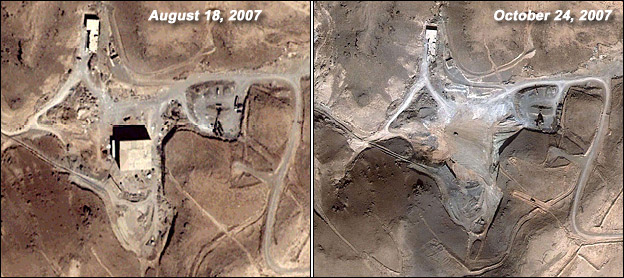UPDATES
The IAEA: countering proliferation at its convenience
July 5, 2011 | Daniel Meyerowitz-Katz

Four long years after Syria’s alleged nuclear program came to a sudden halt due to an [alleged] Israeli air strike, the international community is taking the Assad regime to task. As AP reports, the International Atomic Energy Agency has referred the program to the UN Security Council and it will be discussed next week. As for the delay, the report said that the IAEA had, in fact, been trying to gain access to the site since 2008:
The IAEA has tried in vain since 2008 to follow up on strong evidence that a site in the Syrian desert, bombed in 2007 by Israeli warplanes, was a nearly finished reactor built with North Korea’s help.
The resolution that reported Syria to the Security Council expressed “serious concern” over “Syria’s lack of cooperation with the IAEA Director General’s repeated requests for access to additional information and locations as well as Syria’s refusal to engage substantively with the Agency on the nature of the Dair Alzour site.”
What has sparked the IAEA to suddenly kick into gear on Syria? This excerpt is revealing:
Syria is already on the Security Council’s docket. The council on Thursday expressed united support for the U.N. peacekeeping force on the tense Syrian-Israeli border – even while remaining divided over any direct condemnation of Syria’s crackdown on peaceful demonstrators and human rights abuses.
So while Assad is too busy slaughtering his own people to care about his nuclear program and the rest of the world is finally becoming critical of a regime that has sponsored terrorism and suppressed its own people for decades, it appears that the IAEA figures it can slip this issue into the growing list of indictments. Ironically, this report comes just as Assad’s troops area making a strong push to recapture the city of Hama from Syrian rebels.
The IAEA did nothing to prevent Syria from importing North Korean nuclear technology and building a nuclear plant that was supposedly weeks away from becoming active. Apparently, however, it had to wait until the situation in Syria descended into near-civil war until it took any action, leaving it to Israel to deal with the actual threat of nuclear proliferation in Syria. If this is how the UN body charged with preventing proliferation deals with a rogue regime on the cusp of nuclear capability, it is small wonder that the Iranian nuclear program is still racing ahead.
Tags: Syria





